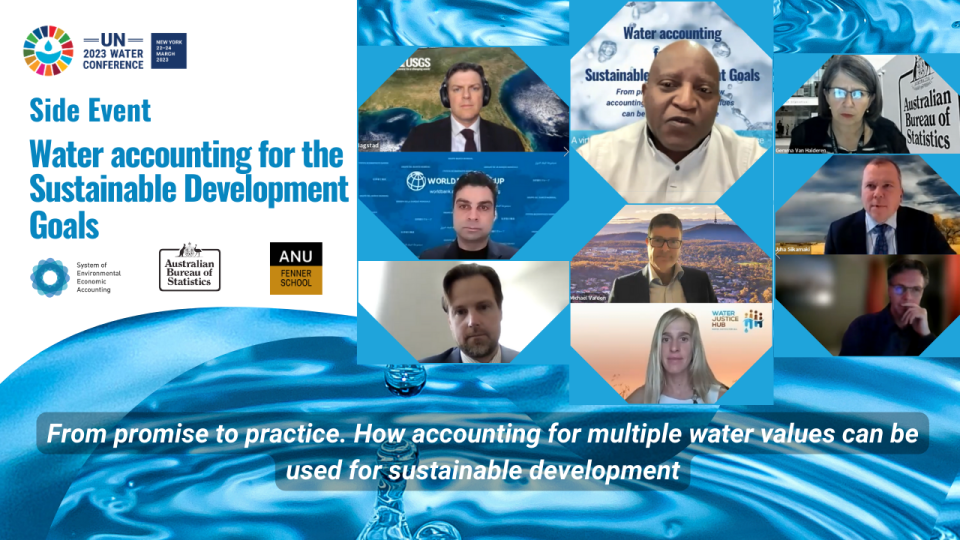Water accounting sets the stage at the UN Water Conference 2023

Nearly 150 people from a wide array of institutions from over 40 countries took part in a special event on Water Accounting for the Sustainable Development Goals held as part of the United Nations Water Conference on 21 March 2023. The event featured two ministers of water and an expert panel conveying a clear message: Water accounting can help water management and planning in many ways, but the key challenge is to increase the understanding and the use of water accounts.
In her address, Australia’s Minister for Environment, The Hon. Tanya Plibersek, spoke of the implementation of the water management plan for Australia’s Murray-Darling Basin and said, “Accurate water accounting can track our recovery targets . . . it can also assure communities that we are achieving the outcomes that the plan sets out.”.
A message from Namibia’s Minister for Agriculture, Water and Land Reform, The Hon. Carl-Hermann Schlettwein, was delivered by Elijah Ngurare the Deputy Executive Director of the Ministry. He brought up the unequal distribution of water resources in Africa remarking that a “clear understanding of the multiple values of water is needed to drive political attention, and financial investment for sustainable water resources development on the continent. This is vital so as to achieve the aspirations of the Africa Water Vision 2025 and the African Union Agenda.“
After these powerful messages, Bram Edens from the United Nations Statistics Division provided a short introduction to water accounting and the System of Environmental-Economic Accounting and drew attention to a recent global review of water accounting done for the Global Commission on the Economics of Water. This was followed by perspectives from five expert panelists.
Juha Siikamaki, Chief Economist at the International Union for the Conservation of Nature stressed the need for more information on the physical and economic aspects of nature to support investment decisions, with the strength of the SEEA framework being that it uses an integrated approach.
Ana Manero, a researcher from the Water Justice Hub, noted that accounting enables effective communication by providing a standard set of terms and avoiding confusion about terms like cost, price and value of water.
“Water accounting gives you a very good picture of how much water is available, how the water is being used, and who are the users of water”, said Poolad Karimi from the World Bank. He added that water accounts need to be more operational by incorporating the accounts in the project management cycles of water infrastructure investments.
Arjan Ruijs from Cardano ACTIAM noted that private investments can help to manage water and sanitation problems as proposed in the initiative Catalysing Private Capital for Water and Sanitation .
Kenneth Bagstad from the United Stated States Geological Survey spoke about the plans for water accounting in the new National Strategy to Develop Statistics for Environmental-Economic Decision and the importance of coordination and integration.
Following the panel Michael Vardon of the Australian National University’s Fenner School of Environment and Society moderated the questions from the audience related on the technical and institutional aspects of building water accounts and the role of water accounting for water management and planning for the SDGs in the face of climate change.
Gemma van Halderen of the Australian Bureau of Statistics and Interim Chair of the United Nations Committee of Experts on Environmental-Economic Accounting, concluded on the importance of a growing understanding and expertise in water accounting and its use to support decision making in the public and private sectors as well as the use of new data sources, tools and materials for capacity building that will make account production easier.
Moving water accounting from promise to practice requires understanding and respecting the multiple values of water and all of the uses and users of water. For this a collaborative and multi-disciplinary approach is needed. With this, water accounting can better inform water governance from local through to national levels the water accounts can provide the evidence for decisions, helping to make the case for targeted investments in the public and private sectors for SDG 6 on clean water and sanitation, SDG 2 Zero hunger with water critical to agriculture, and SDG 12 responsible consumption and production.
